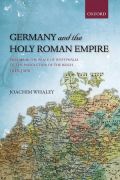
Germany and the holy roman empire: volume ii: the peace of westphalia to the dissolution of the reich, 1648-1806
Whaley, Joachim
In the first single-author account of German history from the Reformation tothe early nineteenth century since Hajo Holborn's study written in the 1950s,Dr Whaley provides a full account of the history of the Holy Roman Empire. Volume II extends from the Peace of Westphalia to the Dissolution of the Reich. Germany and the Holy Roman Empire offers a new interpretation of the development of German-speaking central Europe and the Holy Roman Empire or German Reich, from the great reforms of 1495-1500 to its dissolution in 1806 after the turmoil of the French Revolutionary and Napoleonic Wars. Going against the notionthat this was a long period of decline, Joachim Whaley shows how imperial institutions developed in response to the crises of the sixteenth and seventeenthcenturies, notably the Reformation and Thirty Years War, and assesses the impact of international developments on the Reich. Central themes are the tensionbetween Habsburg aspirations to create a German monarchy and the desire of the German princes and cities to maintain their traditional rights, and how the Reichdeveloped the functions of a state during this period.The first single-author account of German history from the Reformation to theearly nineteenth century since Hajo Holborn's study written in the 1950s, it also illuminates the development of the German territories subordinate to the Reich. Whaley explores the implications of the Reformation and subsequent religious reform movements, both Protestant and Catholic, and the Enlightenment for the government of both secular and ecclesiastical principalities, the minor territories of counts andknights and the cities. The Reich and the territories formed a coherent and workable system and, as a polity, the Reich developed its own distinctive political culture and traditions of German patriotism over the early modern period.Whaley explains the development of the Holy Roman Empire as an early modern polity and illuminates the evolution of the several hundred German territories within it. He gives a rich account of topics such as the Reformation, the Thirty Years War, Pietism and baroque Catholicism, the Aufklrung or German Enlightenment and the impact on the Empire and its territories of the French Revolution and Napoleon. It includes consideration of language, cultural aspects and religious and intellectualmovements. Germany and the Holy Roman Empire engages with all the major debates among both German and English-speaking historians about early modern Germanhistory over the last sixty years and offers a striking new interpretation ofthis important period.Volume II starts with the end of the Thirty Years War and extends to the dissolution of the Reich INDICE: Preface to Volume II I. Reconstruction and Resurgence 1648-1705: the Reich under Ferdinand III and Leopold I Historians and the Reich after the Thirty Years War The Last Years of Ferdinand III: Western Leagues and NorthernWars From Ferdinand III to Leopold I Leopold I and his Foreign Enemies A New Turkish Threat Renewed Conflict with France The Emperor, the Perpetual Reichstag, the Kreise, and Imperial Justice Imperial Networks: the Reichskirche and the Imperial Cities The Imperial Court at Vienna and Dynastic Elevations in theReich The Nature of the Reich: Projects and Culture Interpretations of the Leopoldine Reic II. Consolidation and Crisis 1705-1740: the Reich under Joseph Iand Charles VI Two Wars and Three Emperors Leopold I, Joseph I, and the War of Spanish Succession Joseph I and the Government of the Reich Charles VI: Fruition or Decline? Conflicting Priorities: c.1714 - c.1730 Charles VI and the Government of the Reich The Return of Confessional Politics? The Problem of the Austrian Succession The Ebb of Imperial Power 1733-40? The Reich in Print III.The German Territories, c. 1648-c.1740 An Age of Absolutism? Contemporary Perceptions: From Reconstruction to Early Enlightenment Sonderwege: the Smaller Territories Sonderwege: Austria and Brandenburg-Prussia The Revival of the Court and the Development of Territorial Government The Court: its Culture, its Functions, and its Critics The Development of Military Power Princes and EstatesAn Oppressed Peasantry? Government and Society Government and Economic Development Public and Private Enterprise Christian Polities: Baroque Catholicism Christian Polities: the Territories of the Reichskirche Christian Polities: Protestant Orthodoxy and Renewal From Coexistence to Toleration? Enlightenment andPatriotism IV. Decline or Maturity? The Reich from Charles VII to Leopold II,c. 1740-1792 Three Emperors and a King Silesian Wars, 1740-1763 Managing the Reich without the Habsburgs: Charles VII (1742-45) The Return of the Habsburgs: Francis I (1745-1765) The Reich without Enemies? Germany and Europe 1763-1792 Renewal: Joseph II 1765-c.1776 The Great Reform Debate: Joseph II c. 1778-1790 Restoration: Leopold II 1790-92 Central and Intermediate Institutions of the Reich The Reich, the Public Sphere, and the Nation V. The German Territoriesin the Later Eighteenth Century Enlightenment and the Problem of Reform Crisis and Opportunity The Challenge of the Enlightenment and the Public Sphere Protestant, Catholic and Jewish Aufklrung Aufklrung and Government Cameralism, Physiocracy, and the Provisioning of Society Economic Policy: Manufactures, Guilds, Welfare, and Taxation Administration, Law, and Justice Education and Toleration Courts and Culture The Impact of Reform: Immunity against Revolution? VI. War and Dissolution: the Reich 1792-1806 Ruptures and Continuities The Reichin the Revolutionary Wars Reverberations of the French Revolution: Unrest andUprisings Reverberations of the French Revolution: Intellectuals Schemes for the Reform of the Reich in the 1790s The Peace of Lunville (1801) and the Reichsdeputationshauptschlu (1803) The Transformation of the Reich 1803-05 Final Attempts at Reform and the Dissolution of the Reich 1806 VII. Conclusion Glossary A Note on Terminology and Usage A Note on maps and other online resources Abbreviations Bibliography
- ISBN: 978-0-19-969307-8
- Editorial: Oxford University
- Encuadernacion: Cartoné
- Páginas: 784
- Fecha Publicación: 24/11/2011
- Nº Volúmenes: 1
- Idioma: Inglés
